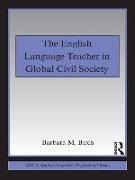Read more
Zusatztext "This book! while providing information and strategies for teachers to become effective agents of change! is not! however! a dry recital of overly complex theories and ideas; it is an interesting and motivating resource that uses the Earth Charter to help empower English language teachers around the world."--The Earth Charter Initiative: Values and Principles for a Sustainable Future! August 2009 Informationen zum Autor Barbara M. Birch is Professor and Chair of the Department of Modern andClassical Languages and Literatures at California State University! Fresno. She hastaught EFL in Spain! Ecuador! and Pakistan! conducted inservice workshops forPeace Corps volunteers in Macedonia! and worked with English teacher trainersin Ulaanbaatar! Mongolia. Zusammenfassung How can English language teachers contribute to peace locally and globally? English language teachers and learners are located in the global civil society– an international network of civil organizations and NGOs related to human rights, the environment, and sustainable peace. English, with its special role as an international language, is a major tool for communication within this network. On the local level, many teachers are interested in promoting reconciliation and sustainable peace, but often do not know how to do so. This book provides information, analysis, and techniques to help teachers around the world take action toward this goal. Balancing, in a readable and accessible way, the global and the local, core and periphery, cultural diffusion and resistance, theory and practice, pessimism and optimism, outsider and insider perspectives, the expert role and the apprentice role, and prescriptive and elicitive methods, it offers an alternative to literature about critical applied linguistics, globalization, and peace education that is simply too complex and wordy to spread easily from theoretician to the classroom teacher. The English Teacher in Global Civil Society:synthesizes threads from many fields and topics into a coherent and empowering argument for the activist role English language teachers can take to promote social changedraws on humanistic education, peace education, cross-cultural understanding, problem-posing, cooperative learning, and critical thinking methodologies to help English language teachers learn how to teach conflict resolution skills in their classrooms covers issues in critical applied linguistics, approaches and methodologies in ESL/EFL, global and local curricular issues, and specific skill areas such reading, writing, and speakingsuggests a new goal for English language teachers: global citizenship.This engaging, informative, provocative, and highly readable book is a welcome resource for English language teacher trainers, pre-service teachers, practicing classroom teachers, and Peace Corps workers around the world. Inhaltsverzeichnis PrefacePart I. The English Language Teacher in Global Civil SocietyChapter 1. The Big PictureChapter 2. Global Civil SocietyChapter 3. Global Civic CultureChapter 4. Global CitizensPart II. The English Language Teacher in Local Civil SocietyChapter 5. Sustainable PeaceChapter 6. Local Uncivil SocietiesChapter 7. Pro-social CapitalistsChapter 8. Education for Global CitizenshipPart III. The English Language Teacher and Pedagogies of TransitionChapter 9. Conflict TransformationChapter 10. ToleranceChapter 11. RemembranceChapter 12. ReconciliationChapter 13. Forgiveness ...

